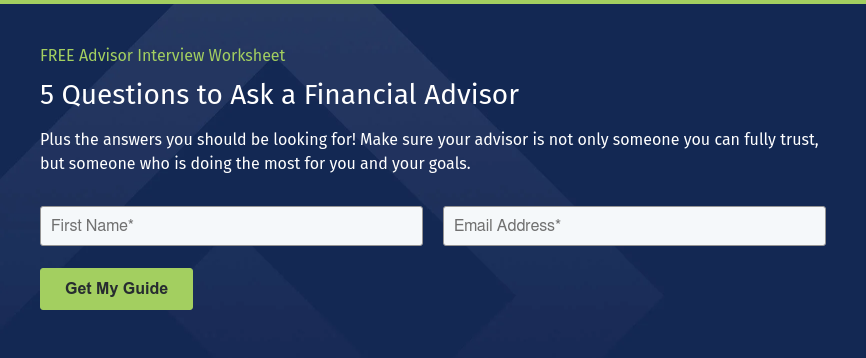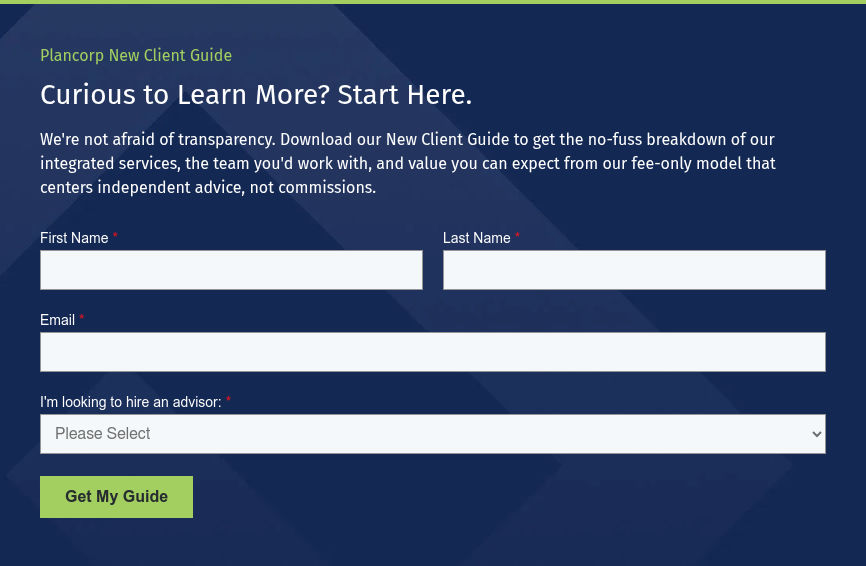When it comes to managing your money, one of the most important decisions you’ll make is whether to hire a financial advisor or handle things yourself.
With access to online brokerages, robo-advisors, and countless personal finance tools and more information than ever before, the DIY approach has never been more accessible.
But financial decisions are increasingly complex as your net worth, investment portfolio, and life responsibilities grow.
So, should you hire a financial advisor or continue with a DIY approach? This article will help you evaluate your situation, compare the pros and cons of each method, and ultimately decide what’s best for your financial future.
DIY vs. Financial Advisor: A Quick Comparison
|
Feature |
DIY Approach |
Hire a Financial Advisor |
|
Cost |
Typically lower (may pay trading or platform fees as well as pay for supplemental advice as needed) |
Includes advisor fees, which vary by fee structure (AUM, hourly, flat-fee, etc.) |
|
Decision-Making |
All investment decisions are made alone |
Financial planning and investment management decisions made with guidance from a trusted advisor |
|
Time Commitment |
High – research, analysis, and monitoring |
Low - advisors thoughtfully minimize your time commitment by managing strategy and implementation |
|
Emotional Bias |
Higher risk of impulsive or emotional decisions |
Advisors help reduce behavioral errors |
|
Breadth of Services |
Typically focused on investments |
Holistic: retirement planning, estate planning, tax planning, and more |
|
Complexity Handling |
Suitable for straightforward finances |
Ideal for complex financial situations or high assets |
When a DIY Approach Might Make Sense
Managing your finances on your own can be a viable option if your situation is relatively simple and you enjoy learning about markets, taxes, and investment strategy. You may consider going DIY if:
- You have a strong interest in personal finance and investing. You’re willing to put in the time to stay up to date on markets, fund options, tax considerations etc.
- Your finances are relatively straightforward (e.g., no business ownership, trusts, or complex estate plans).
- You’re comfortable regularly rebalancing your asset allocation, staying current on tax laws, and navigating stock market volatility.
- You’re focused on minimizing costs through low-cost brokerage platforms and robo-advisors.
A DIY approach offers flexibility and savings—especially for those early in their careers or with modest portfolios. However, it requires discipline, time, and a tolerance for market ups and downs.
When Hiring a Financial Advisor Might Be the Right Move
A good financial advisor or wealth manager provides more than just investment advice. They act as a strategic partner who helps align your money with your financial goals, manages risks, and keeps your plan on track through changing markets and life events.
You may benefit from hiring a professional if:
- You’ve experienced or are anticipating a major life change (marriage, divorce, inheritance, career shift, sale of a business).
- Your finances are increasingly complex, requiring coordination across investment management, tax planning, estate planning, and insurance.
- You’re incorporating company equity into your financial plan.
- You’re approaching retirement and need a drawdown plan that considers risk tolerance, asset allocation, and tax efficiency.
- You don’t have the time, interest, or expertise to confidently manage your portfolio or long-term plan.
Working with the right financial advisor can help you make better decisions, avoid costly mistakes, ensure you’re taking advantage of every opportunity, and generally feel more confident in your financial future. It may sound woo woo, but peace of mind is a key benefit of working with an advisor you trust.
What to Look for in a Financial Advisor
If you decide to seek professional help, it’s important to choose a well-qualified advisor who puts your interests first. Here’s what to prioritize:
1. Credentials
Look for designations such as CFP® (Certified Financial Planner)—a mark of rigorous training and a fiduciary commitment.
2. Fiduciary Standard
A fiduciary financial advisor is legally obligated to act in your best interest. Not all advisors are fiduciaries: some may face conflicts of interest if they earn commissions on the products they recommend.
3. Fee Structure
Understand how the advisor gets paid:
- Fee-only: Paid directly by the client, not through commissions.
- Fee-based: May earn a combination of fees and commissions.
- Assets under management (AUM): Advisor charges a percentage of your investment assets.
Transparency in pricing is essential to evaluating whether an advisor is right for you.
4. Services Offered
The best advisors offer comprehensive financial planning—including estate planning, retirement planning, investment strategy, tax planning, and insurance analysis. Some specialize in niches like entrepreneurs, physicians, or multigenerational planning.
5. Experience and Fit
Look for someone who understands your specific needs and has worked with clients in similar financial situations. A strong fit will lead to a more collaborative, long-term relationship.
The Hidden Costs of Going It Alone
Many people choose a DIY path to save money on advisor fees. But it’s important to weigh the bottom line holistically. Even small missteps in your investment or tax strategy can erode wealth over time. Additionally untapped opportunity is difficult to measure, but equally as impactful, especially for those with growing wealth.
Here are some of the most frequent pitfalls DIY investors encounter:
Reacting Emotionally to Market Volatility
Without the guidance of a financial advisor, many investors make impulsive decisions in response to stock market volatility—selling low during downturns or chasing returns when markets surge.
These emotionally-driven moves can derail a sound investment strategy and significantly impact long-term performance. An advisor provides behavioral coaching to keep you focused on your financial goals, not the headlines. You might be surprised to learn just how much behavioral biases can impact your financial plan. While an advisor can’t remove biases from your life, they can set up a structure that minimizes their negative impacts on your life and plan.
Poor Asset Allocation
Proper asset allocation—the balance between stocks, bonds, and other investments—is critical to managing risk tolerance, especially as you near retirement.
DIY investors often under-diversify, overconcentrate in certain sectors, or fail to rebalance their investment portfolio regularly. These missteps can increase risk and reduce potential returns, and those effect compound greatly over decades.
Missing Tax-Saving Opportunities
Tax planning isn’t just for April. DIY investors often overlook year-round strategies that reduce your lifetime tax liability, such as:
- Asset location (placing the right investments in taxable vs. tax-advantaged accounts)
- Tax-efficient withdrawal strategy in retirement
Without strategic tax planning, you may end up paying more than necessary, eroding your portfolio’s after-tax return or what is available to you in retirement or to pass on as a legacy.
Overlooking Estate Planning Considerations
Estate planning goes beyond having a will. It includes beneficiary designations, trusts, powers of attorney, and strategies to minimize estate taxes. Many DIY investors neglect this critical area of financial planning, putting their loved ones at risk of probate delays, unintended distributions, or unnecessary tax burdens.
Inadequate Planning for Retirement, Inflation, and Longevity
A common DIY mistake is underestimating how much you’ll need to retire—and how long that money needs to last. Without a structured retirement planning strategy, you may overlook the impact of:
- Inflation on purchasing power
- Healthcare costs in retirement
- Required minimum distributions (RMDs)
- Withdrawal rates that protect against outliving your savings
A wealth manager can help build a plan that aligns with your long-term goals while managing these variables.
Bottom Line: Advisor Value Goes Beyond Investments
According to Vanguard’s Advisor Alpha study, working with a trusted financial advisor can add about 3% in net returns annually through behavioral coaching, strategic asset allocation, tax efficiency, and withdrawal planning, which is often quite a bit more than you’d typically pay an advisor (~1% of your assets in most cases).
Blended Models: Robo-Advisors and Hybrid Advice
If you’re looking for a middle ground between DIY and full-service advice, you might consider:
- Robo-advisors: These digital platforms offer automated investment management based on your goals and risk tolerance. They’re typically low-cost and efficient but limited in scope.
- Hybrid solutions: Some firms offer robo-advisors with access to human advisors for more nuanced support—especially useful when life changes introduce new complexity.
Making the Decision: Key Questions to Ask
Still unsure if you should hire a financial advisor or go DIY? Ask yourself these questions:
- Do I have the time and interest to manage my own investments?
- Am I confident navigating taxes, estate planning, and long-term goals?
- How would I react to a major market downturn?
- Have I made consistent progress toward my financial goals in recent years?
- Would having a trusted partner reduce my financial stress or uncertainty?
Ultimately, the choice comes down to your comfort, priorities, and the complexity of your finances.

Final Thoughts: Your Financial Future Deserves a Plan
There’s no universally right answer to the question: “Should I hire a financial advisor?” But making an informed decision now can pay off for decades to come.
If this has been on your mind, ask yourself this: When the market takes a hit, how confident are you that your plan is still on track? If you aren't very confident in your response, it's probably a good idea to find an advisor that's right for you.
Ready to Move Forward?
If you’re exploring whether working with a professional is right for you, our team of fiduciary, fee-only financial advisors is here to help. We specialize in serving clients with complex needs and significant assets who want to simplify decision-making and plan with confidence.
Curious about working with Plancorp? Download our New Client Guide to get the rundown on what it's like to be a client: from integrated services to fee schedules and the world-class client experience we strive to deliver every day.










